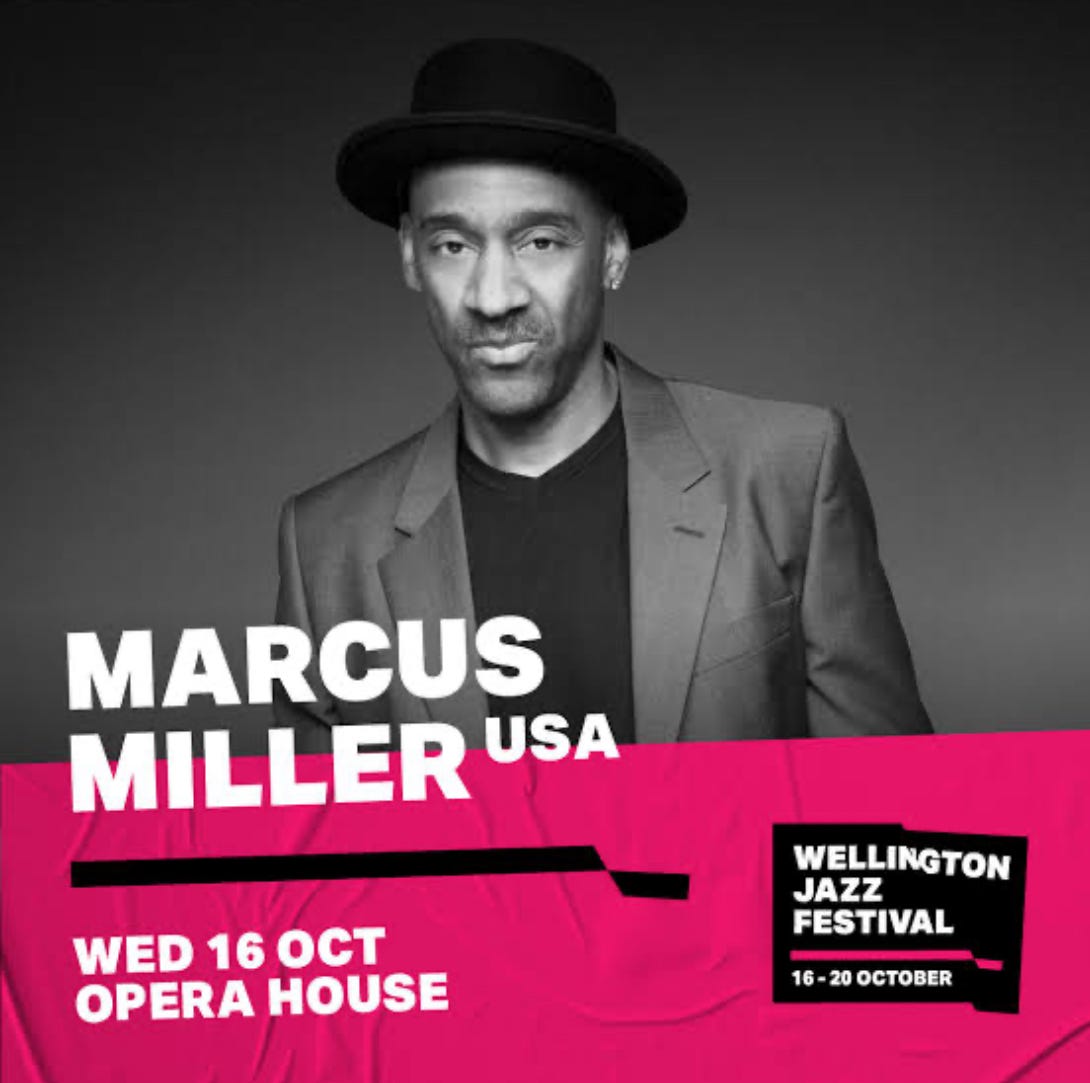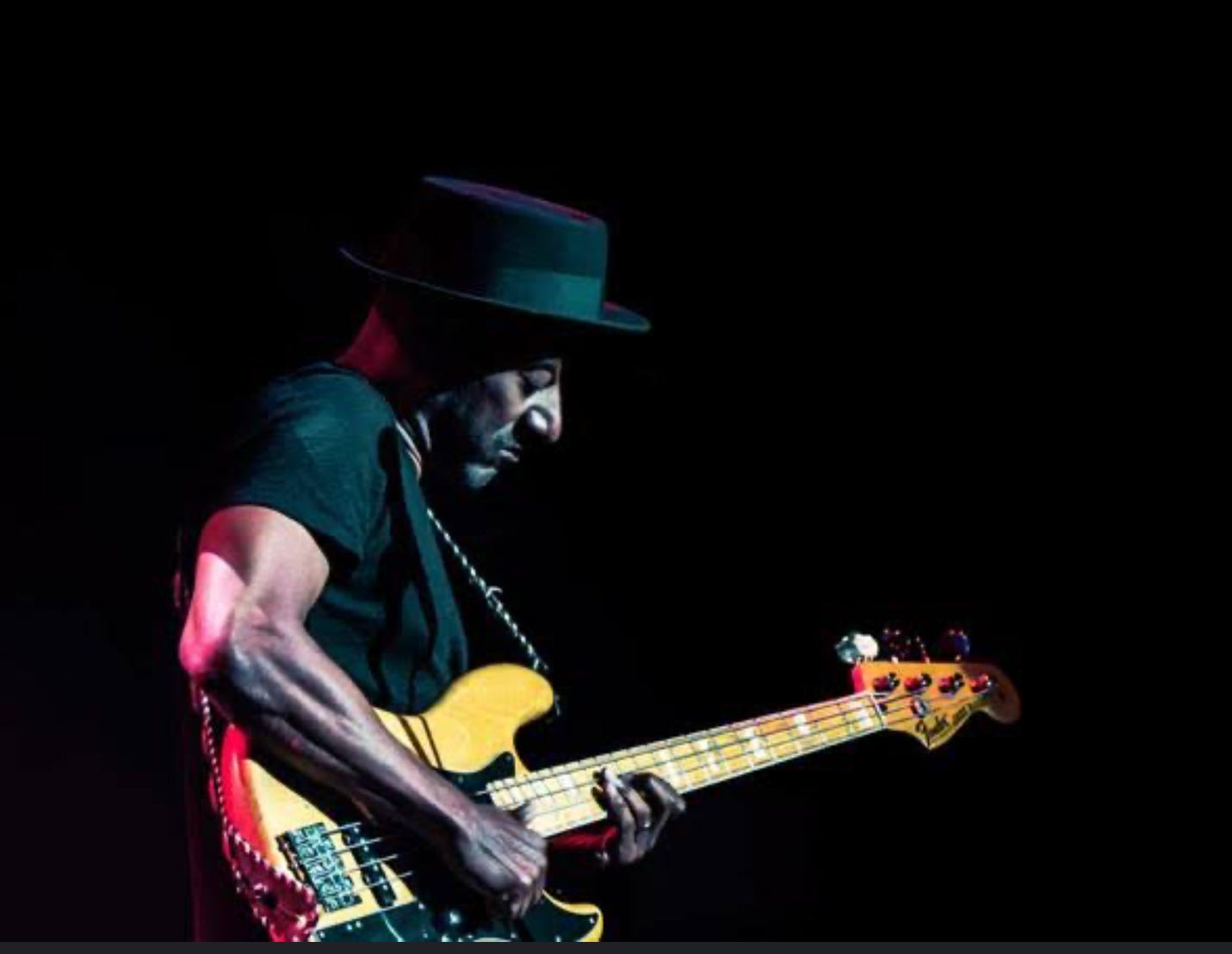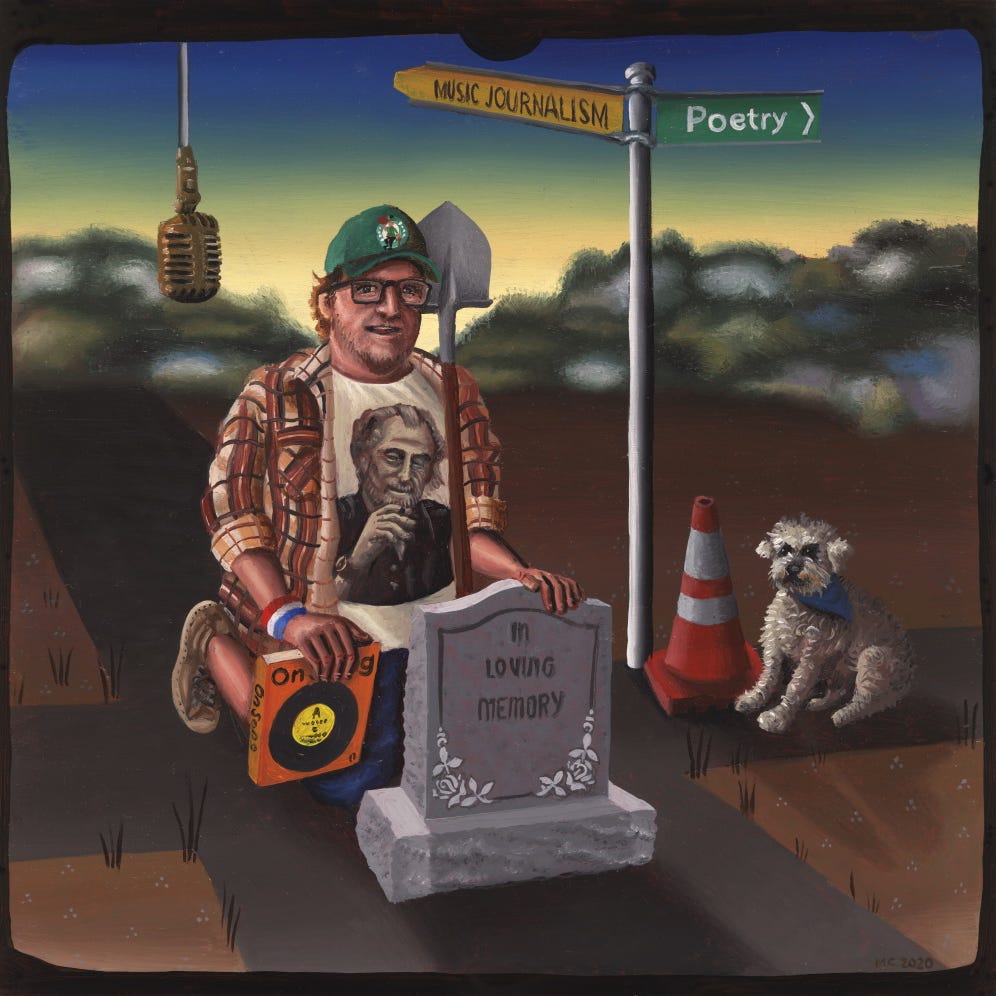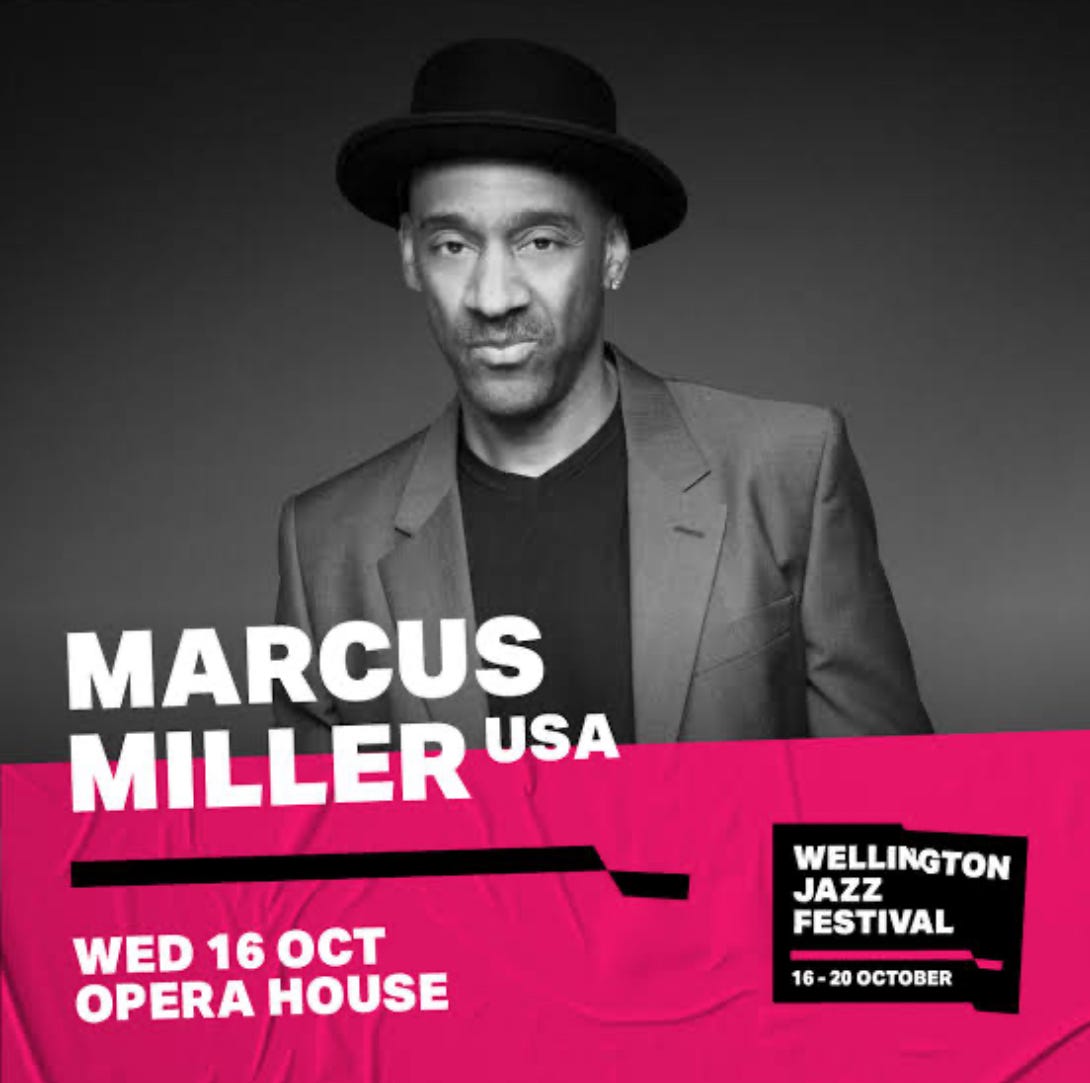Gig Review: Marcus Miller Opens Jazz Fest with Subtle Thriller!
Remember when there used to be gig reviews? I do. I used to write them, before the newspaper stopped caring about such things. I’m bringing them back!
Wellington Jazz Festival: Marcus Miller
The Opera House, Wellington
Wednesday, October 16
I was excited to see Marcus Miller open the Wellington Jazz Festival this year. I couldn’t think of many people better suited to be all things to all people, both a living legend in his own right and a sideman and collaborator to some of the original giants. A rich back catalogue to pick from, and the perfect person to see if you’re just out on a whim, one of the plus-ones to one of the sponsors, off to opera-clap and hope for the best. Whatever your situation, deep fan or first-timer, Miller and his band seemed likely to captivate.
And that was safe as houses when it comes to good guesses.
I had a dual discovery of Miller through his soundtrack work in the late 80s and early 90s (Siesta, House Party, Boomerang…) right at the same time I was learning about Miles Davis, and starting with his late-80s material, during which Miller was his bandleader and composer.
A bass player primarily, Miller has also recorded and performed live across various instruments, including clarinet and saxophone, and is a producer, composer, session great, and solo star. From a time in the seventies playing on the records of almost everywhere, and being a member of the Saturday Night Live Band to the 80s decade where he established himself as a solo star, all but resuscitated Miles Davis’ career, and started a solid run as soundtrack composer, it might be easy for a jazz purist to want to locate Miller to the side of the genre and throw funk at him as if it was an insult. But Miller wrote songs for Luther Vandross and played with Wayne Shorter, he was delivering soft jazz and driving hard funk at the same time, lasting collaborations with David Sanborn and Grover Washington Jr here, sessions with Aretha Franklin and Mariah Carey there. Need a player that can back a singer, you call Marcus Miller. Need someone to fill in the sound, lead the band, or take direction, it’s all Miller.
So, with one of the best CVs in modern music, a 65 year old Miller played his first Wellington concert with an ace band that featured the dazzling chops of drummer Anwar Marshall, the subtle heavy lifting of keyboardist Xavier Gordon, and the twin horn attack of Donald Hayes (saxophone) and Russell Gunn (trumpet). You just knew you were in the presence of collective greatness from the opening hits and notes. Caught in their sway for close to two hours, the audience was taken on a journey through some of Miller’s impeccable highlights.
Playing the 70s slinky end of fusion that must have caught his ear early, with a cover of Billy Cobham’s majestic Red Baron, and then paying tribute to the recent passing of his friend and frequent collaborator Sanborn with a lengthy workout across Maputo (a song he wrote for Sanborn’s 1986 duo record with Bob James, Double Vision) Miller’s deep mumble of bass, an elastic knot untied via a series of slaps, taps, tickles and pops, propelled the tunes in deep conversation with Marshall’s groove-filled drumming. From there they would throw to Gunn and Hayes for horn solos, and Gordon’s amazing piano work, which was so often the melodic glue, as well as being a deep bed within the rhythm work too.
Huge highlights of the evening included Mr. Pastorius — something of a double tribute really, given Miller wrote the song about one of his bass idols, the legendary Jaco Pastorius, but also he wrote it for Miles Davis. Miller explained that it had been his hope to hear Miles return to the sound of the 50s and 60s, when they recorded it in the late 1980s. But he knew to never ask Davis such a thing. Miles was only ever looking forward in direction, he told the crowd. But as the recording unfolded, he took delight in hearing Miles run chorus after chorus in the style of his classic modal playing. The band then thrilled with a version of the song (originally recorded on Davis’ 1989 album, Amandla) which featured Gunn replicating both the dulcet 80s tones of Miles Davis and then moving into the more classic phrasing from his earlier, legendary recordings.
A double dose of Miles, meant we also got to hear Tutu, the title track to the album Miller made with the jazz legend in 1986. The deep R’n’B of the song saw it move Miles towards the tentative hip-hop of his final recordings, and here it delighted the already educated among the audience, and must have served as a thrilling introduction to anyone not already familiar, the band turning on a dime from the purposeful slow-groove of the song’s main feel to add an almost salsa element. Critics at the time loved to suggest that Miles had been moved toward a sound he would have hated, but I always heard Miller’s intentions as being to make the sort of music that Miles had played in the 50s, just with 80s production and instrumentation. In that sense, Gunn’s work here, especially when locked in with Hayes, could help you hear Tutu as the mid-80s version of Kind of Blue’s opener, So What.
Tutu was named in tribute to human rights and anti-apartheid activist, Archbishop Desmond Tutu. Miller also revived his song Gorée (Go-ray) written after a trip to Africa where he and band were taken to see the island that housed slaves before they were shipped to Africa. Confronted with the visceral evidence of what his ancestors had endured, Miller penned the song which he said had been a live highlight for a time, and then put to bed. He felt it was time to return it to the stage now, given it also carries with it a feeling of hope for humanity and the resilience of the human spirit. Gorée was the emotional peak of the evening, Miller playing the bass clarinet, and Hayes stepping up to deliver a series of choruses on his sax with the passion and intensity of Dave Liebman.
Miller’s great enthusiasm for his music, the way he and band never felt like they were performing by rote, rather taking pleasure as well as giving it, made for the special magic of the evening. The dexterity and virtuosity was of course spellbinding, but it was the deep musical connection — to history and all of the greats Miller had worked with, and to the feeling within the spaces of individual notes — that made this so moving as well as funky and thrilling.
When they encored with The Beatles’ Come Together I was nervous that finally the cheese was bubbling to the surface. But no. After a few runs of the bass line intro, Miller and band went for a wicked stroll, turning the song on its ear to let a fluid jam drain all across the stage. It was, again, masterful. We were in the presence of such towering greatness. And it never felt phoned in, the players never seemed bored. They gave their all in service to both the music and the audience. A special start to the festival. An amazing chance for Wellington to finally see and hear and feel a snapshot of the musical greatness that Miller has helped to place in this world.









Stunningly good concert and excellent review. Outstanding solos and energy from all star band orchestrated by supremo living legend Marcus. Come Together a whimsical encore given the treatment. Absolute pleasure to be there!
Spot on Mr Sweetman. I'm glad I was there and thanks for summing up so well.